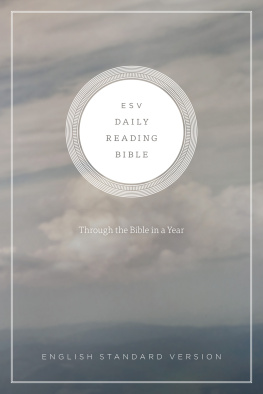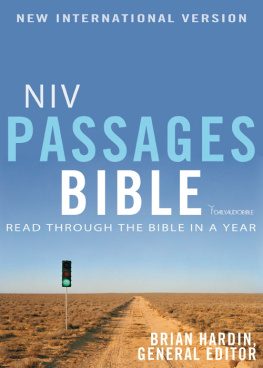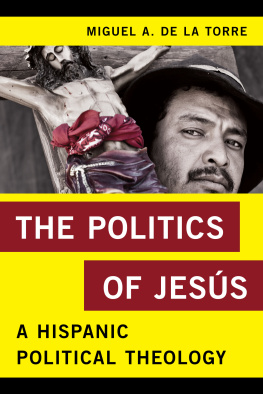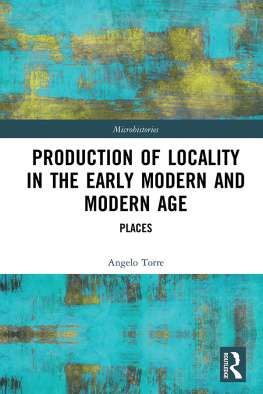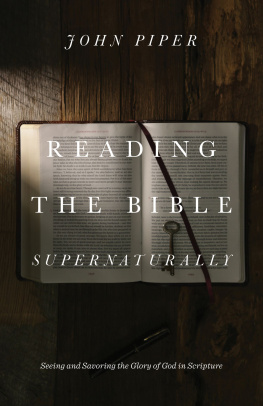Reading the Bible from the Margins
Miguel A. De La Torre
Founded in 1970, Orbis Books endeavors to publish works that enlighten the mind, nourish the spirit, and challenge the conscience. The publishing arm of the Maryknoll Fathers & Brothers, Orbis seeks to explore the global dimensions of the Christian faith and mission, to invite dialogue with diverse cultures and religious traditions, and to serve the cause of reconciliation and peace. The books published reflect the views of their authors and do not represent the official position of the Maryknoll Society. To learn more about Maryknoll and Orbis Books, please visit our website at www.maryknoll.org.
Copyright 2002 by Miguel A. De La Torre
All rights reserved. No part of this publication may be reproduced or transmitted in any form or by any means, electronic or mechanical, including photocopying, recording, or any information storage or retrieval system, without prior permission in writing from the publisher.
Queries regarding rights and permissions should be addressed to: Orbis Books, P. O. Box 308, Maryknoll, NY 10545-0308.
Published by Orbis Books, Maryknoll, NY 10545-0308
Manufactured in the United States of America
Library of Congress Cataloging-in-Publication Data
De La Torre, Miguel A.
Reading the Bible from the margins / Miguel A. De La Torre
p. cm.
Includes bibliographical references and index.
ISBN 1-57075-410-1 (pbk.)
1. BibleHermeneutics. I. Title.
BS476 .D4 2002
220.6'01dc21 2002000619
To my campus colleagues
who participated in the Fall 2000 Exotic debate
Contents
Preface
This book was forged in the classroom. Upon first coming to Hope College as an assistant professor, I was asked to design a course that would expose a predominantly Euroamerican student body to non-Eurocentric Christian thought. This was not an easy task, and at times the very nature of the subject matter created tension, if not conflict, within the campus community. Nevertheless, my colleagues in the Religion Department totally supported and encouraged me, even when some of them disagreed with my perspectives. Their commitment to intellectual freedom is greatly appreciated. Furthermore, they provided advice and important feedback on sections of this work, and for that I am also in their debt.
One of the courses I developed was titled Reading the Bible from the Margins. The objective of the course was to read the biblical text through the eyes of non-Euroamericans, in hopes of discovering how the Bible is incorporated by the disenfranchised seeking to foster liberation from oppressive social structures that foster racism, sexism, and classism. Additionally, the course contested how Euroamerican students traditionally read the biblical text, challenging their interpretations constructed within their culture. Many began to read and understand the Bible from the perspective of other groups, with new eyes that inform, strengthen, and complete their faith. If it wasn't for the students who took this course, this book would not exist. On the basis of that experience, I attempted to answer the questions and objections these students raised in the classroom. Any success this book might have is due to the lively discussions that occurred during class. For this I offer my sincerest thanks.
I am also grateful to the administration at Hope College, which made a commitment for a more diverse campus, recognizing that there is much to be learned from those who historically represent marginalized groups within our society. The college's faithfulness in soliciting and hearing voices of color, rather than seeking political correctness by simply displaying faces of color, is an encouragement for those who at times grow weary of trying to develop a more just community. This dedication was expressed to me by the administration when it graciously provided a summer writing grant through The Jobe and Julie Morrison Family Faculty Development Fund in combination with The Norman and Ruth Peale Fund. Because of this generosity, the necessary time required to finish the project became available.
I would be remiss if I did not mention the copyediting done by Jonathan Schakel. Additionally, I am grateful to Anthony Guardado of the Van Wyler Library for his assistance in tracking down sources and obtaining specific articles. Furthermore, the assistance given by Susan Perry at Orbis Books during the creation of this book is greatly appreciated. Her constant editing, constructive criticism, and challenging questions made the finished product exceedingly better than the original.
Last, but certainly not least, I wish to express my heartfelt thanks to my family, specifically my wife, Deborah, my son, Vincent, and my daughter, Victoria. They constantly put up with me storming around the house, complaining about having to finish a section by tomorrow. They believed and supported me when I doubted myself. Their constant unconditional love provided the emotional support needed to finish this book. For this, and much more, thank you.
Introduction
All football players are damned! According to the Scriptures, anyone who plays football is cursed by God and will spend eternity in hell. The Bible is very clear about this. According to Deuteronomy: The pig, because its hoof is divided and it does not chew its cud, is unclean. You shall not eat its flesh, nor touch its dead skin (14:8). So anyone who touches a pigskin, another name for a football, is cursed. During my adolescent years, I did not participate in high school football. In fact, most of the team members were bullies who would ambush and beat me up. So I was pleased to find that the Bible provides the justification for their condemnation. Even God forbids the throwing around of the pigskin, and who am I to question God's commands? All I'm called to do is obey God's word and proclaim God's displeasure with this barbaric sport.
Even though you, along with the vast majority of Christendom, may question my reading of this biblical text, it is a tenable interpretation. All biblical interpretations are valid to the one who is doing the interpreting. Yet my understanding of Deuteronomy 14:8, regardless of how legitimate and logical it may be to me, is still rejected by the majority of Christians. Why? Because my interpretation of this text attempted to justify my bias toward a group of people whom I loathed, football players. Through my interpretation I justified my hatred toward them, and if I am in a position of power within a community, I could use my interpretation to create social structures that would turn my biases into societal norms, justifying and legitimizing the oppression of football players. It is easy to see how I fuse and confuse what I proclaim the Bible says with what the Bible actually states. In my mind, they are the same. My hatred for football becomes the Bible's condemnation of the sport.
Here lies the first major lesson we can learn about reading the Bible. While we may claim that the biblical text is true and authoritative, not all interpretations are true and authoritative. My interpretation of the Deuteronomy passage cannot be confused with what the text actually says, nor with its possible application to our lives today. Yet, we do this all the time. I'm sure you have heard well-meaning Christians make comments like the following: The Bible says that the woman should submit to the man and take care of the duties of the household, According to the Bible, God hates homosexuals, or The Bible clearly calls for a separation of races. In these statements the interpretation of the speaker is given the same validity as the Bible, making the interpreter's words inerrant. I believe in the Bible, but not necessarily in how the Bible is interpreted by humans.





